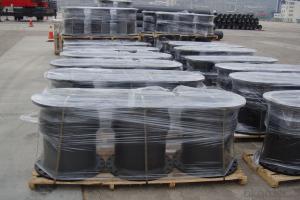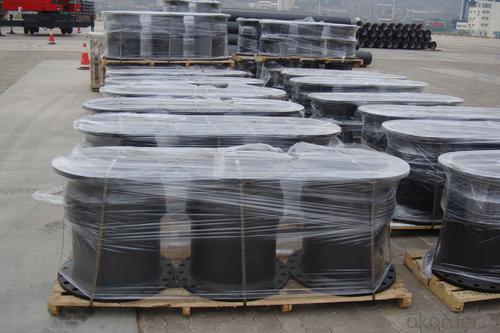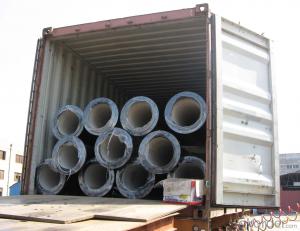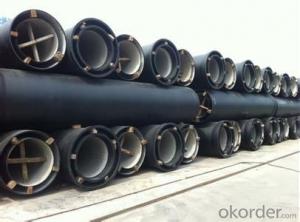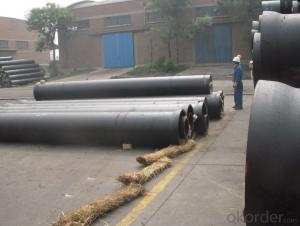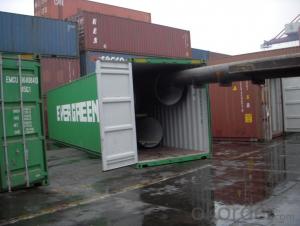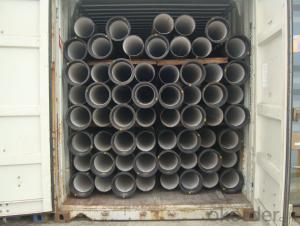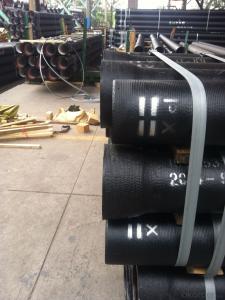DUCTILE IRON PIPES AND PIPE FITTINGS K8 CLASS DN1800
- Loading Port:
- Tianjin
- Payment Terms:
- TT OR LC
- Min Order Qty:
- 22 pc
- Supply Capability:
- 3000 pc/month
OKorder Service Pledge
OKorder Financial Service
You Might Also Like
Material : Ductile Cast Iron
Size Range : DN 80mm to DN 2000mm
Unit Effective Length : 6m or 5.7m
Manufacture Standard: ISO 2531:1998/ EN 545:2006/EN 598:2007
Annual capacity : 200,000 tons
Coating Exterior: Zinc 130g/m2 according to ISO 8179-1 and bitumen coating 70 microns.
Cement Interior: Portland Cement/ High Alumina Cement/ Sulphate Resisting Cement Lining according to ISO 4179
Special requirements on external coating and internal lining can be applied
We also provide accessories such as SBR/EPDM rubber gaskets, lubricant paste, pipe caps, PE sleeves, etc.
Additional Parts:
Each pipe is strictly inspected according to related standard to ensure permanently high performance.
Easy Installation at site and service free for life
Long Service Lifespan
Quotation will arrive you within 24hours once we get your inquiry.
We guarantee offering you a competitive price.
A copy of original inspection reports of pipes will be offered after shipment.
Photos of loading process will be sent to the customer after shipment effect.
We will follow-up the delivery progress after shipment effect and update to the customer on weekly basis.
- Q: Can ductile iron pipes be used for water supply in remote areas?
- Yes, ductile iron pipes can be used for water supply in remote areas. Ductile iron pipes are known for their strength and durability, making them suitable for various applications, including water supply systems. Their resistance to corrosion and ability to withstand high pressure make them a reliable choice for transporting water even in remote areas where maintenance and accessibility may be challenging.
- Q: Can ductile iron pipe be used for water treatment plant sludge handling?
- Yes, ductile iron pipe can be used for water treatment plant sludge handling. Ductile iron pipes are known for their durability, strength, and resistance to corrosion, making them suitable for handling various types of wastewater and sludge. They can efficiently transport sludge from different stages of the water treatment process within the plant without any adverse effects.
- Q: Can ductile iron pipes be used for irrigation of sports fields?
- Yes, ductile iron pipes can be used for irrigation of sports fields. Ductile iron pipes are known for their strength, durability, and flexibility, making them an ideal choice for various applications, including irrigation. These pipes have high resistance to external pressures and impact, which is beneficial for sports fields that may experience heavy foot traffic and potential damage. Additionally, ductile iron pipes have excellent corrosion resistance, ensuring long-term performance and minimal maintenance. Their smooth interior surface also allows for efficient water flow, preventing clogs and ensuring adequate irrigation for the sports fields. Overall, ductile iron pipes are a reliable and suitable option for irrigation systems in sports fields.
- Q: How is ductile iron pipe manufactured?
- Ductile iron pipe is manufactured through a process called centrifugal casting. In this process, molten iron is poured into a spinning mold, causing the iron to be distributed evenly along the inner surface of the mold. As the mold cools, the iron solidifies and forms the pipe's shape. This method ensures a strong and durable pipe with excellent tensile strength and resistance to corrosion.
- Q: What are the different types of joints used with ductile iron pipe?
- The different types of joints commonly used with ductile iron pipe include push-on joints, mechanical joints, restrained joints, flanged joints, and welded joints. Each type of joint offers different benefits and is used depending on the specific requirements of the installation.
- Q: Can ductile iron pipes be used for conveying gases?
- Yes, ductile iron pipes can be used for conveying gases. Ductile iron has excellent mechanical properties and is resistant to corrosion, making it a suitable material for transporting various types of gases. Additionally, ductile iron pipes are known for their strength and durability, making them a reliable choice for gas transmission systems.
- Q: Are ductile iron pipes suitable for sewage treatment plants?
- Yes, ductile iron pipes are suitable for sewage treatment plants. Ductile iron pipes are known for their durability, strength, and corrosion resistance, making them ideal for handling the corrosive and abrasive nature of sewage. They can withstand high pressure and are capable of accommodating heavy loads and ground movements, making them a reliable choice for sewage treatment facilities. Additionally, their smooth interior surface minimizes friction, reducing the risk of clogs and improving the flow of wastewater.
- Q: The plug connection DN800 ductile iron pipe has been installed. "Shall I think so?"
- Ductile iron pipes are defined as pipes made by casting more than 18 of casting molten iron by adding a spheroidal agent and then centrifugally centrifugally cast by a centrifugal nodular cast iron machineDuctile iron pipe ([span]Ductile Cast Iron Pipes), referred to as ball pipe, ductile iron pipe and ductile iron pipe etc..
- Q: Can ductile iron pipes be used for stormwater drainage systems?
- Yes, ductile iron pipes can be used for stormwater drainage systems. Ductile iron pipes are known for their strength, durability, and corrosion resistance, making them suitable for various applications, including stormwater drainage. They can handle high volumes of water flow and withstand heavy traffic loads, making them a reliable choice for stormwater management. Additionally, ductile iron pipes have excellent joint performance, ensuring a watertight and secure connection, which is crucial for preventing leaks and maintaining the integrity of the stormwater drainage system. Overall, ductile iron pipes are a viable option for stormwater drainage systems due to their robustness, longevity, and ability to withstand the harsh conditions often associated with stormwater management.
- Q: Can ductile iron pipes be used for irrigation pivot systems?
- Indeed, irrigation pivot systems can utilize ductile iron pipes. Renowned for their robustness, longevity, and resistance to corrosion, ductile iron pipes are apt for numerous purposes, including irrigation. These pipes have the capability to withstand substantial water pressure, guaranteeing a dependable and enduring means of transporting water to irrigation pivot systems. Moreover, ductile iron pipes harmonize seamlessly with a variety of fittings and connectors commonly employed in irrigation systems, thereby facilitating effortless installation and upkeep. All in all, employing ductile iron pipes in irrigation pivot systems emerges as a pragmatic decision that ensures efficacious water distribution while minimizing the likelihood of pipe failure.
Send your message to us
DUCTILE IRON PIPES AND PIPE FITTINGS K8 CLASS DN1800
- Loading Port:
- Tianjin
- Payment Terms:
- TT OR LC
- Min Order Qty:
- 22 pc
- Supply Capability:
- 3000 pc/month
OKorder Service Pledge
OKorder Financial Service
Similar products
Hot products
Hot Searches
Related keywords
